Overview
Developers often face significant coding challenges that can hinder their efficiency and productivity. The integration of an AI log analyzer, such as Kodezi, can effectively address these issues. By automating log management, Kodezi reduces human error and enhances incident detection. Furthermore, it provides actionable insights that allow development teams to focus on innovation and strategic tasks rather than manual log evaluations.
The benefits of using Kodezi are substantial. Teams experience enhanced efficiency, improved incident detection, and optimized resource utilization. This collective streamlining of processes not only boosts productivity but also elevates code quality. Imagine being able to redirect your focus from tedious log evaluations to more impactful development work. Wouldn't that transform your workflow?
In addition to these advantages, Kodezi empowers teams by providing tools that facilitate better decision-making. By leveraging AI, developers can gain insights that inform their strategies and enhance their overall performance. Explore the tools available on the Kodezi platform to revolutionize your coding practices and experience these efficiency gains firsthand.
Introduction
The digital landscape is overflowing with data, presenting critical challenges for development teams in managing logs effectively. As organizations strive to enhance productivity and streamline operations, the integration of AI log analyzers emerges as a transformative opportunity. These advanced tools:
- Automate log management
- Improve incident detection
- Bolster security
- Enhance overall efficiency
However, with technology evolving rapidly, how can teams ensure they leverage these tools to their fullest potential while navigating the complexities of modern software development?
Kodezi | Professional OpenAPI Specification Generator - AI Dev-Tool: Automate Log Analysis for Enhanced Efficiency
Developers often face significant challenges when managing logs, which can hinder their productivity. Kodezi OS emerges as a robust OpenAPI specification generator that transforms log analysis for development teams. By leveraging AI-driven features, it independently observes records, detects irregularities, and provides actionable insights. This automation allows teams to redirect their focus toward strategic initiatives rather than getting bogged down in manual log management.
Furthermore, the efficiency achieved through Kodezi OS accelerates the evaluation process and reduces the risk of human error, ensuring that logs are consistently and accurately assessed. As the AI log analyzer becomes a core component of DevOps and SecOps workflows, tools like Kodezi OS are essential for maintaining operational excellence and enhancing overall productivity in software development. Imagine how much more you could accomplish by streamlining your log management!
To fully utilize these advancements, groups are encouraged to explore AI tools like Kodezi OS. Get started for free today and discover how Kodezi can enhance your coding skills and streamline your codebase management. Why not take the first step towards increased efficiency and improved code quality?
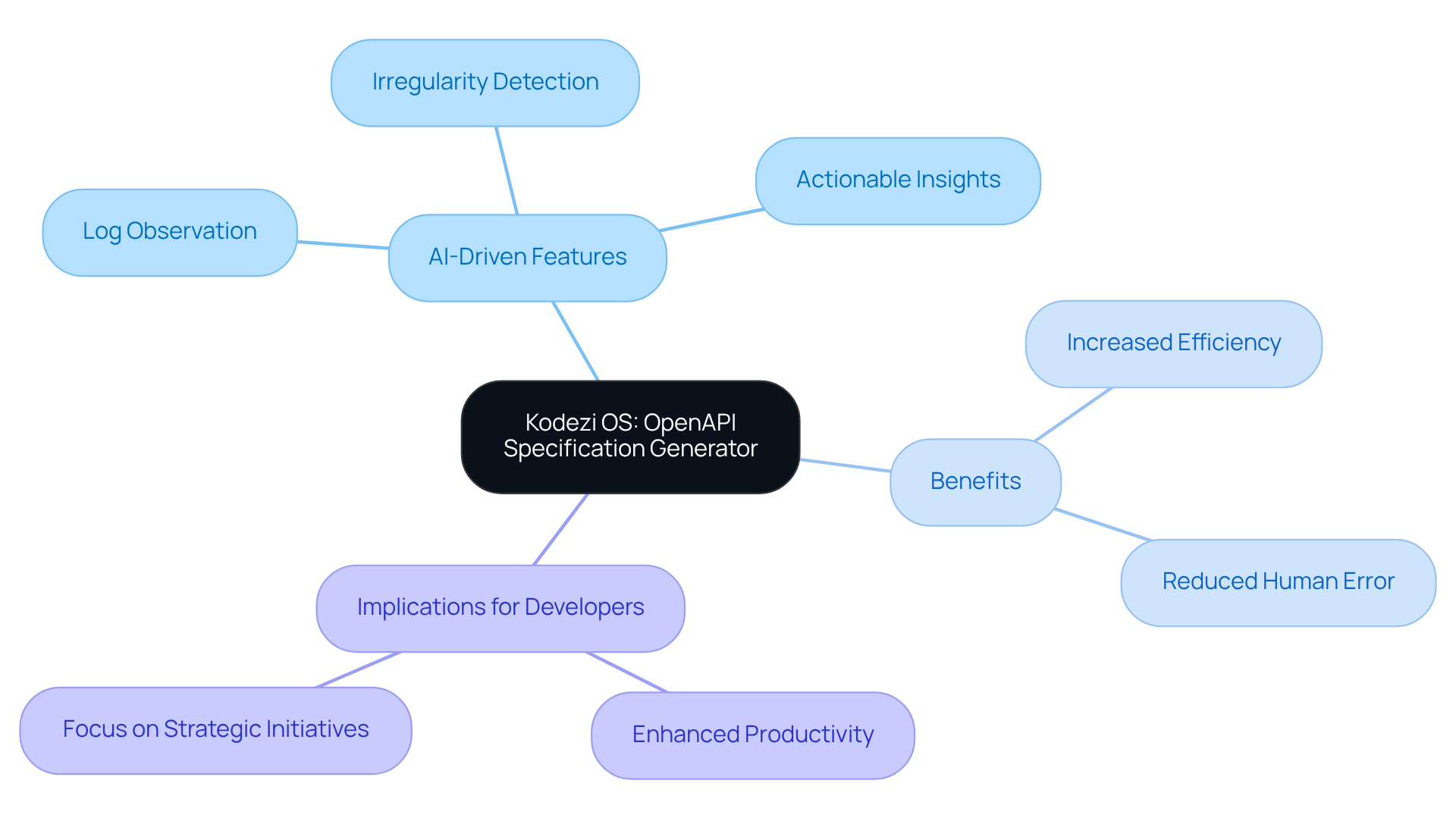
Faster Incident Detection: Streamline Response Times with AI Log Analyzers
AI log analyzers significantly improve the detection of incidents by processing extensive log data in real-time. Traditional methods, often reliant on manual reviews, can be slow and prone to human error. In fact, a staggering 85% of businesses still depend on manual security processes, which can hinder detection and response times. Conversely, the AI log analyzer swiftly identifies patterns and anomalies, alerting teams to potential issues before they escalate. This proactive approach not only expedites response times but also strengthens system reliability by utilizing an AI log analyzer to ensure that incidents are addressed promptly.
Companies utilizing an AI log analyzer for incident response have reported substantial improvements, with automated systems reducing breach containment time by as much as 40% and decreasing security team workload by 50%, which significantly alleviates burnout. As Ginni Rometty, former CEO of IBM, aptly states, "AI will not replace humans, but those who use AI will replace those who don't." This underscores the competitive edge gained by adopting AI in incident response, fundamentally transforming how organizations tackle security challenges.
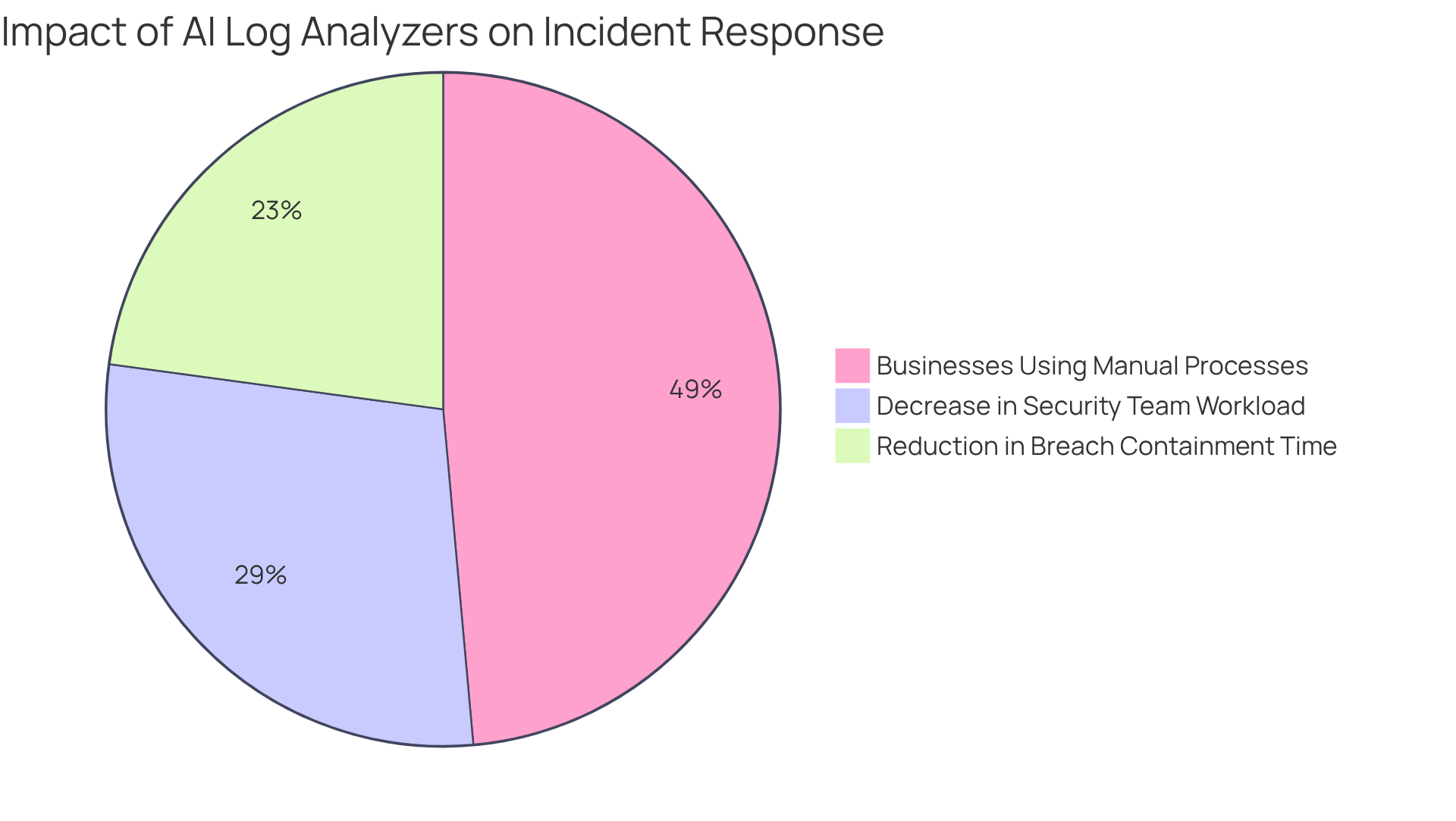
Enhanced Security: Strengthen Threat Detection with AI-Powered Log Analysis
AI-driven log examination significantly enhances security by continuously monitoring logs for suspicious activities, including unauthorized access attempts and unusual patterns that may indicate potential breaches. This proactive approach not only facilitates early identification of security threats but also supports compliance with industry standards and regulations. Utilizing advanced machine learning algorithms, these tools evolve to recognize new threats, thereby enhancing their detection capabilities over time. For instance, organizations utilizing AI log analyzers have reported a significant improvement in threat detection efficiency, with many observing a decrease in response times to incidents.
With 93% of security leaders expecting daily AI assaults by 2025, and 74% of IT security experts indicating considerable effects from AI-driven risks, incorporating AI in log examination becomes crucial for upholding strong security measures and protecting sensitive information. Furthermore, with 40% of all phishing emails aimed at businesses now produced by AI, the necessity for an AI log analyzer has become more urgent than ever. The typical expense of breaches, which is $4.88 million, further highlights the financial significance of adopting these advanced security measures.
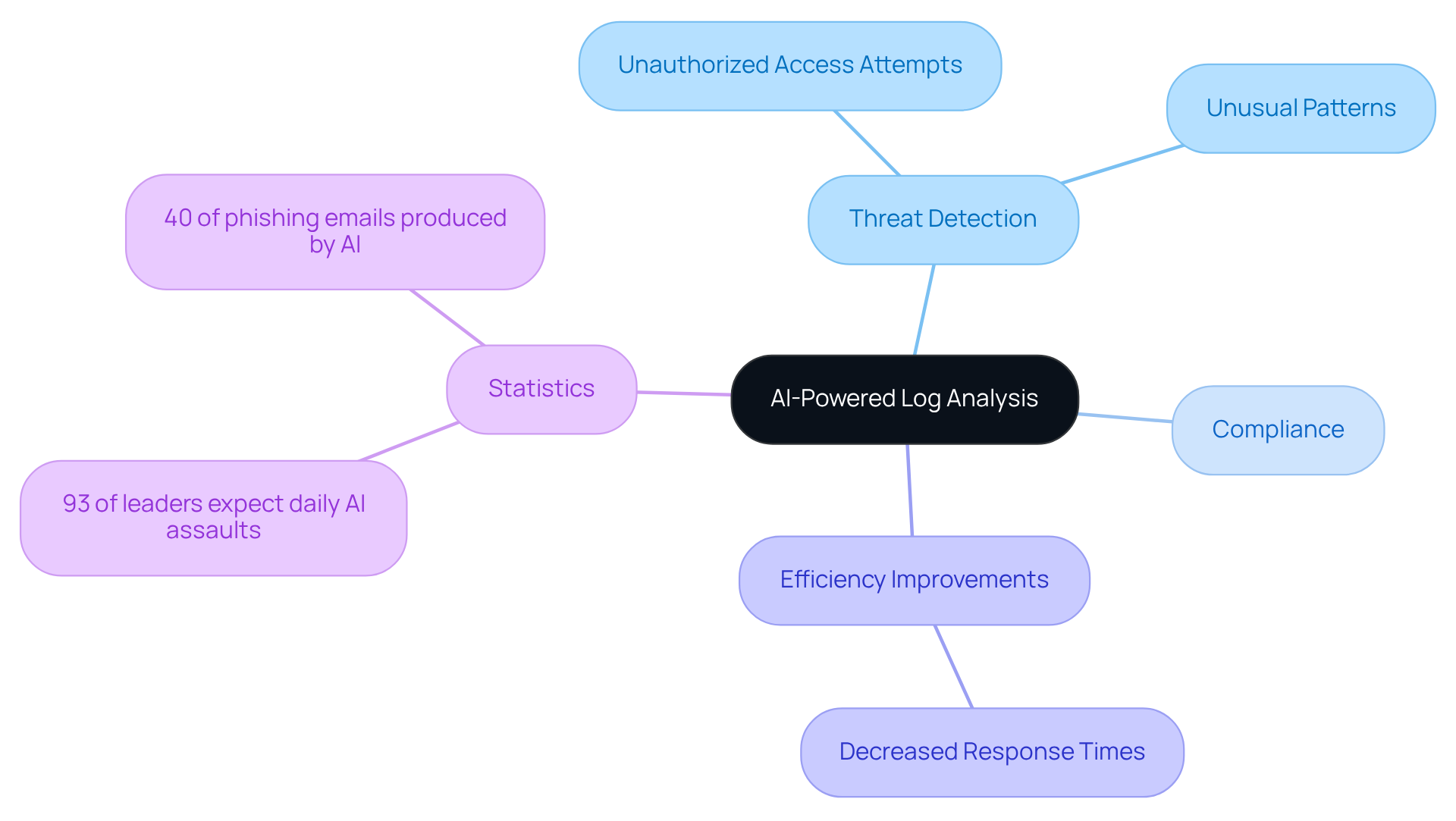
Automated Root Cause Analysis: Quickly Identify and Resolve Issues
In today's fast-paced digital landscape, developers face significant challenges when troubleshooting problems. An AI log analyzer enables automated root cause examination, allowing teams to swiftly identify fundamental issues by analyzing log data and correlating it with system performance metrics. This capability dramatically reduces troubleshooting duration, allowing teams to implement solutions more effectively. For instance, companies utilizing AI for root cause investigation can resolve issues up to 89% faster, fundamentally changing how development teams approach problem-solving.
Furthermore, by automating this process, teams can focus on enhancing system performance rather than getting bogged down in repetitive diagnostic tasks. The integration of the AI log analyzer in log examination not only simplifies issue identification but also facilitates ongoing error tracking, ensuring that only relevant log levels are monitored. Continuous Error Tracking reports log levels that are less than or equal to 300, thereby improving monitoring precision.
In addition, this proactive approach to troubleshooting leads to enhanced operational efficiency and reduced downtime, a critical factor in today's digital environment. The average cost of downtime is $5,600 per minute, highlighting the financial implications of delays. Moreover, businesses employing automated failover systems experience an average of only 27 minutes of downtime per year, showcasing the effectiveness of AI in minimizing disruptions. As John Hunter noted, addressing the root cause not only alleviates symptoms but also enhances the overall system, reinforcing the value of AI in troubleshooting.
![]()
Optimized Resource Utilization: Maximize Efficiency with AI Insights
The AI log analyzer tools significantly enhance resource utilization by delivering actionable insights into system performance and pinpointing areas of over- or under-utilization. By leveraging historical data alongside current usage patterns, AI can recommend precise adjustments to resource allocation. This ensures that systems operate at peak efficiency while minimizing unnecessary costs. Such optimization not only boosts overall performance but also results in substantial cost savings for organizations.
For instance, companies using an AI log analyzer for resource management have reported improved operational efficiency and reduced expenses. This showcases the tangible benefits of integrating AI into their development processes.
As Ginni Rometty noted, 'AI can provide a significant competitive advantage when integrated properly.' Similarly, Andrew Ng aptly stated, 'AI is the new electricity,' highlighting its potential to revolutionize how businesses manage resources effectively.
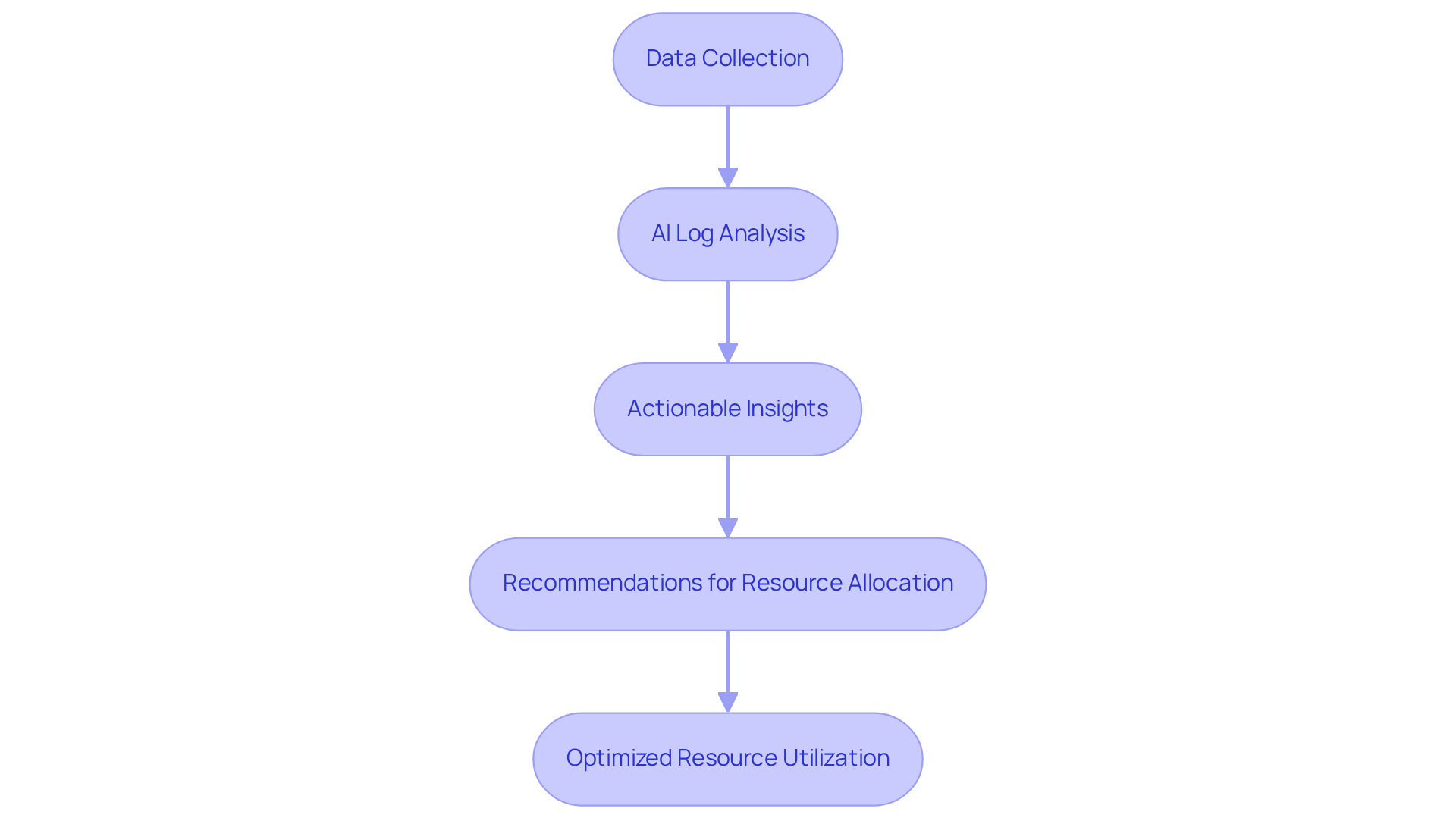
Increased Efficiency and Productivity: Leverage AI for Better Team Performance
Developers often face significant challenges in managing their coding tasks effectively. The use of an AI log analyzer can transform group efficiency and productivity by automating routine tasks and providing real-time insights. Kodezi CLI, for instance, addresses these challenges by minimizing the time dedicated to manual log evaluations, which typically require weeks. This allows development teams to focus on innovation and primary development tasks.
Organizations that utilize tools such as the AI log analyzer and Kodezi CLI have reported productivity gains of up to 66%. This impressive statistic translates to substantial improvements in efficiency, enabling teams to make knowledgeable decisions promptly. Furthermore, quick access to pertinent information enhances project outcomes and raises software quality.
In addition, with AI handling repetitive tasks, developers can concentrate on complex problem-solving. This shift ultimately fosters a more creative and efficient work environment. Have you considered how much time your team could save by automating routine processes?
To experience these benefits firsthand, explore the '5 minute quickstart' and 'See a demo' options available with Kodezi CLI. Discover how these tools can elevate your coding practices and improve your team's productivity.
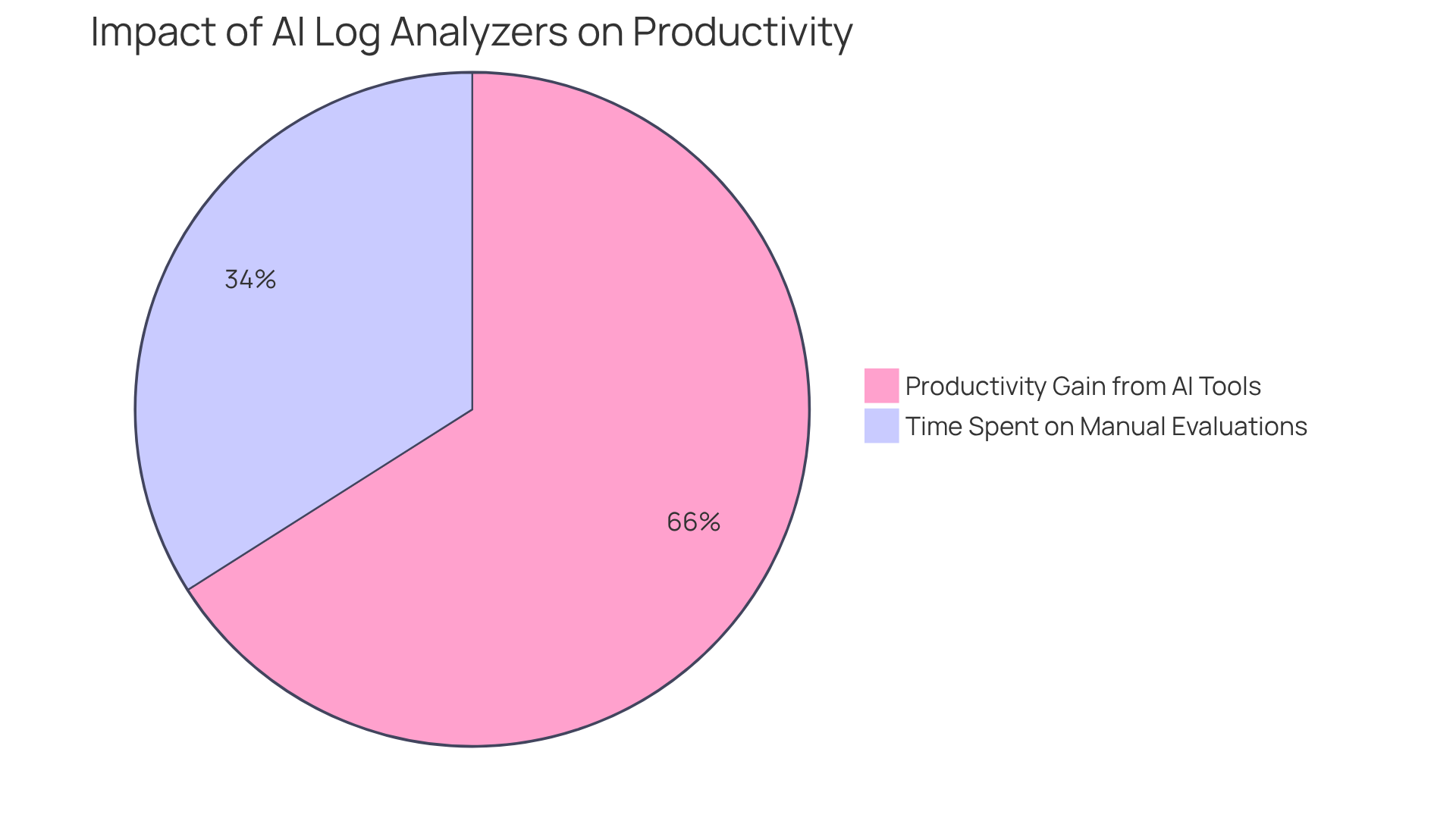
Predictive Maintenance: Anticipate Issues Before They Arise
The AI log analyzer is vital for predictive maintenance, as it examines historical log data to identify trends and patterns that may indicate future issues. This proactive strategy allows teams to detect and address potential failures before they escalate, significantly reducing downtime and improving system reliability. By adopting such forward-thinking practices, organizations not only boost operational efficiency but also prolong the lifespan of their systems and components.
Indeed, predictive maintenance strategies can decrease downtime by 10-20%, as highlighted by Deloitte's studies, which demonstrate the importance of utilizing AI insights to anticipate and mitigate risks. Furthermore, a study conducted by PwC and Mainnovation reveals that 60% of maintenance specialists view reliable access to information as crucial for effective predictive maintenance execution, underscoring the importance of information availability in this domain.
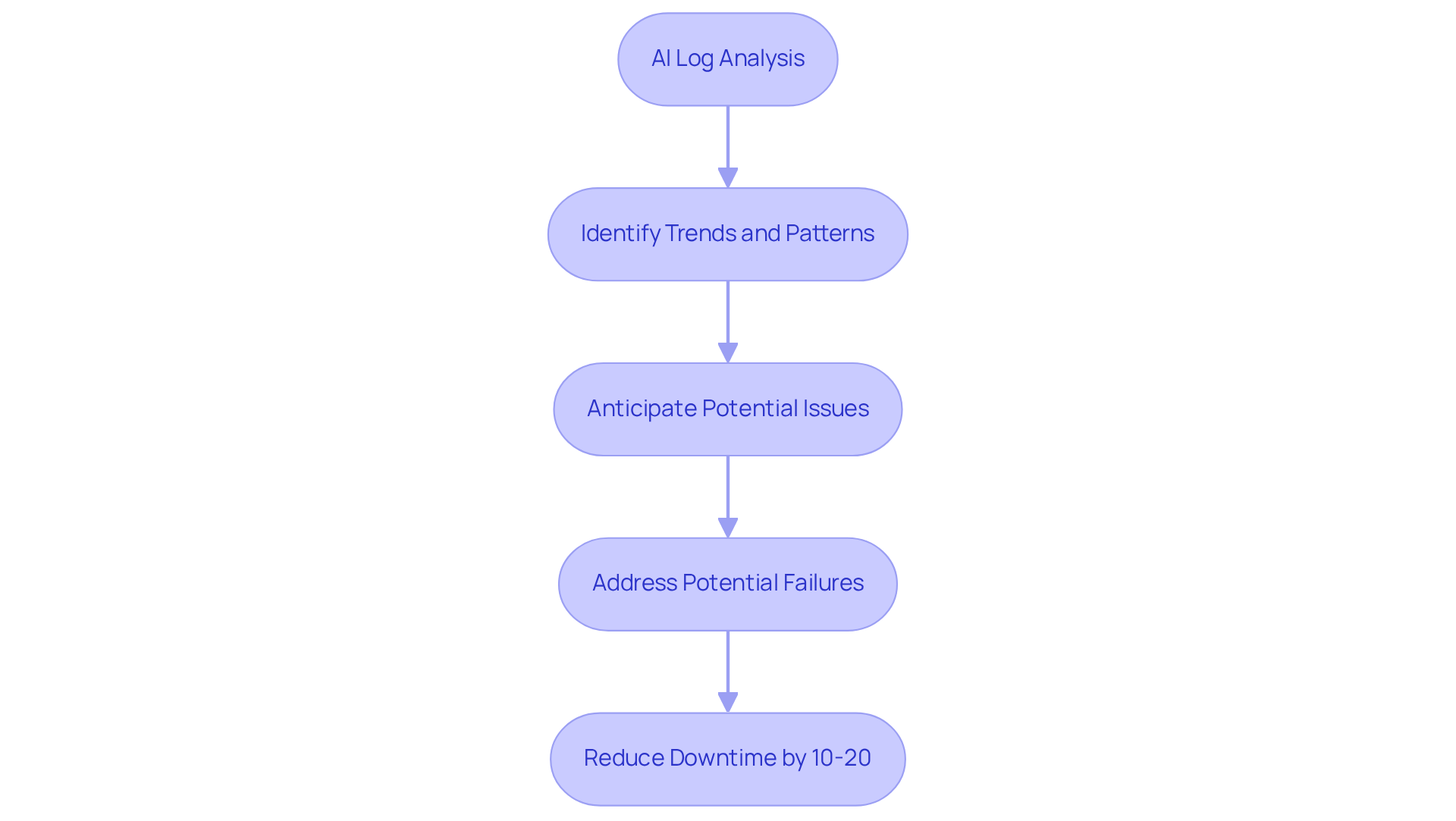
Improved Collaboration: Foster Teamwork with Shared AI Insights
Developers often face significant challenges when it comes to coding and debugging. AI log analyzers can greatly enhance cooperation among colleagues by centralizing log information and providing collective insights. When log data is accessible to all group members, it fosters a transparent communication atmosphere, ensuring everyone is aligned on system performance and issues. This shared understanding not only enhances communication but also encourages teamwork and innovation, leading to superior project outcomes.
In fact, organizations that prioritize collaboration see a 20% increase in employee retention and a 41% boost in customer satisfaction. Furthermore, according to Gallup, managers account for 70% of the variance in employee engagement, emphasizing the critical role of effective leadership in fostering collaboration. By leveraging AI insights, teams can make data-driven decisions that enhance their overall performance, ultimately resulting in better outcomes. Research from the Harvard Business Review shows that groups make superior decisions 87% of the time compared to individuals, underscoring the value of collaborative efforts.
With Kodezi, over 1,000,000 users have transformed their debugging processes, finding it easier to resolve bugs and enhance productivity. Users have described Kodezi as a 'lifesaver' for correcting issues and improving coding skills. Wouldn't you like to join them? Get started for free or schedule a demo to discover how Kodezi can elevate your team's efficiency.
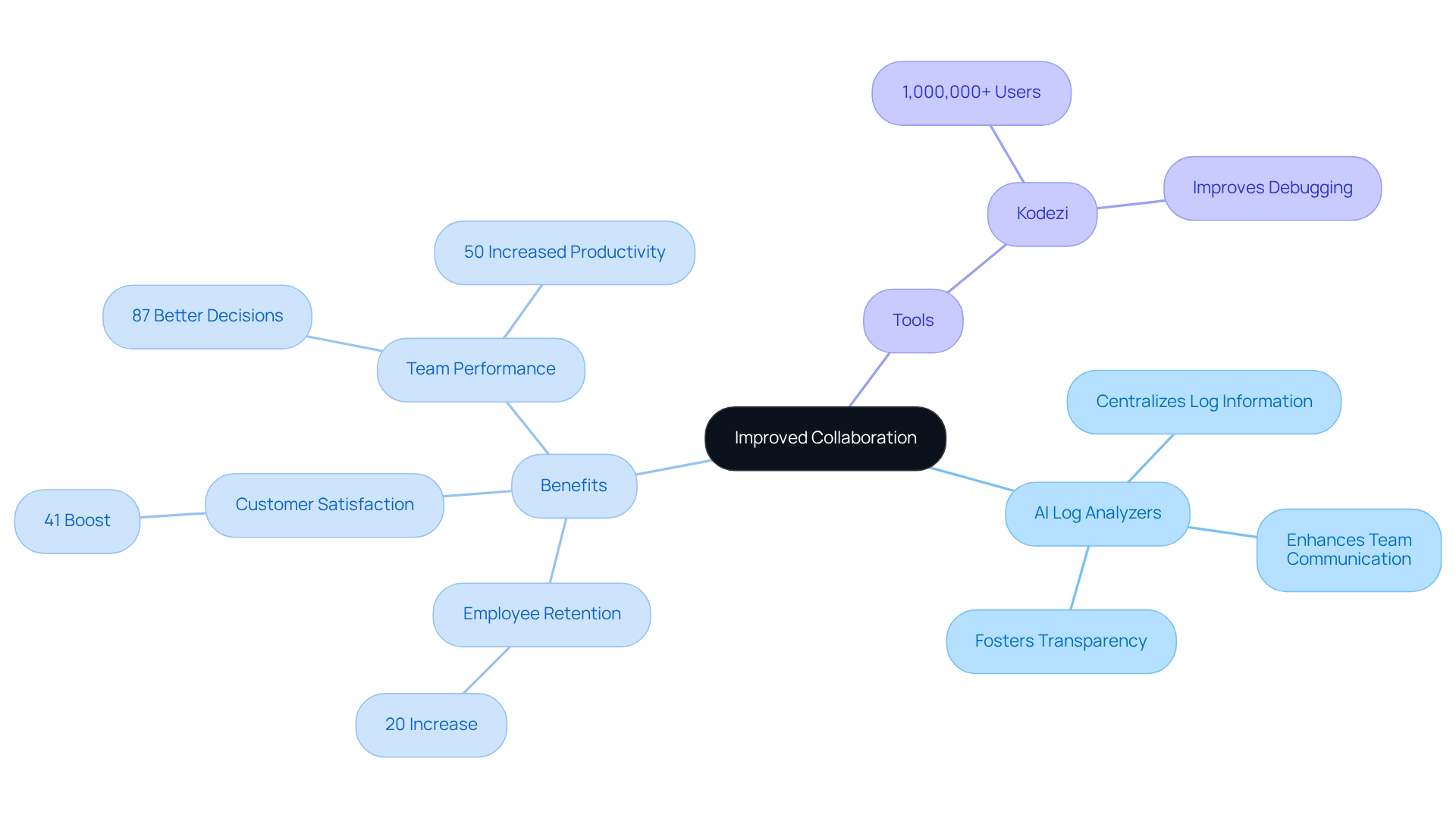
Scalability: Adapt AI Log Analysis to Growing Data Needs
As organizations face growing information requirements, the use of an AI log analyzer is essential. In 2024, the global volume of information is projected to reach 149 zettabytes, with estimates indicating it will rise to 181 zettabytes by 2025. This rapid expansion results in systems generating unprecedented amounts of log information that can be processed by an AI log analyzer.
How can organizations adapt to this increase? AI addresses this challenge by utilizing sophisticated algorithms that effectively manage and analyze extensive datasets, with approximately 402.74 million terabytes of information produced daily in 2024. This scalability is crucial for maintaining effective log management practices, enabling teams to sustain operational efficiency even as their information needs evolve.
As organizations increasingly rely on AI-driven solutions, the use of an AI log analyzer to handle and extract insights from expanding log information becomes vital for informed decision-making and enhanced performance. Furthermore, as Michele Goetz observed, firms are beginning to confront the practical aspects of AI, acknowledging the real challenges of adapting to these growing data needs.
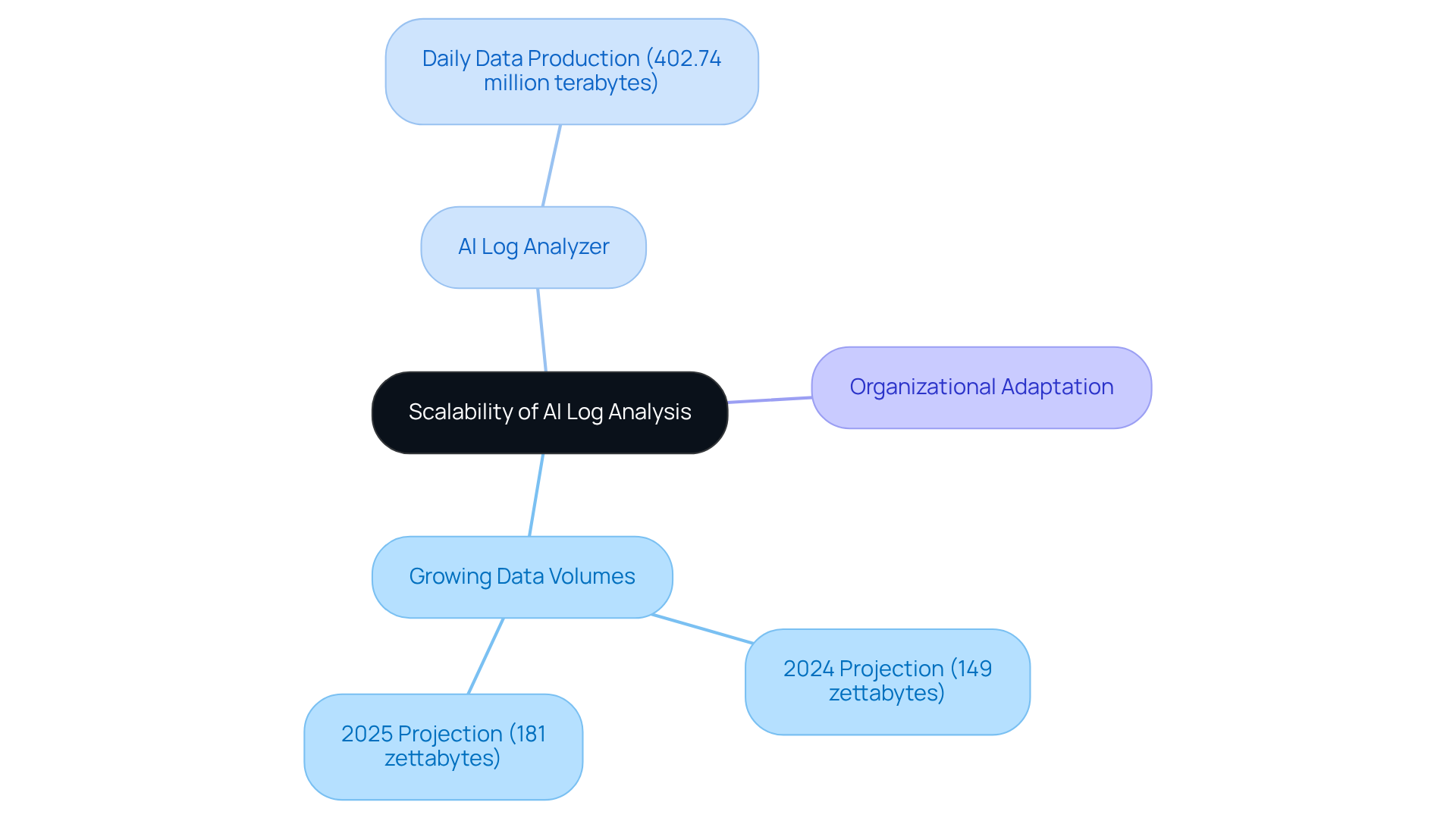
Seamless Integration: Enhance Existing Tools with AI Log Analysis
Coding challenges are a common hurdle for developers, often leading to inefficiencies and frustration. AI log analyzer tools can be effortlessly integrated with existing development and monitoring systems, significantly enhancing their capabilities through automation and improved accuracy without disrupting established workflows.
How can Kodezi help you overcome these challenges? By connecting with platforms such as GitHub, CI/CD pipelines, and observability tools, Kodezi provides additional layers of insight and automation. Its CLI autonomously improves codebases and fixes bugs before they reach production, ensuring that performance bottlenecks are addressed and security compliance is maintained.
Imagine maximizing the utility of your current tools while reaping the benefits of AI's advanced capabilities. This integration not only drives overall efficiency and effectiveness but also supports enhanced productivity and code quality. For instance, 84% of software development teams using adaptive AI tools report a 41% reduction in debugging time, which directly translates to accelerated development cycles and improved time-to-market. Furthermore, as organizations increasingly adopt generative AI, the adoption rate has surged from 14% in 2021 to 63% in 2023, showcasing the growing recognition of AI's transformative potential in enhancing traditional monitoring tools.
Are you ready to embrace the future of development? As Ginni Rometty stated, "AI will not replace humans, but those who use AI will replace those who don't." Explore the tools available on the Kodezi platform and discover how they can revolutionize your coding practices.
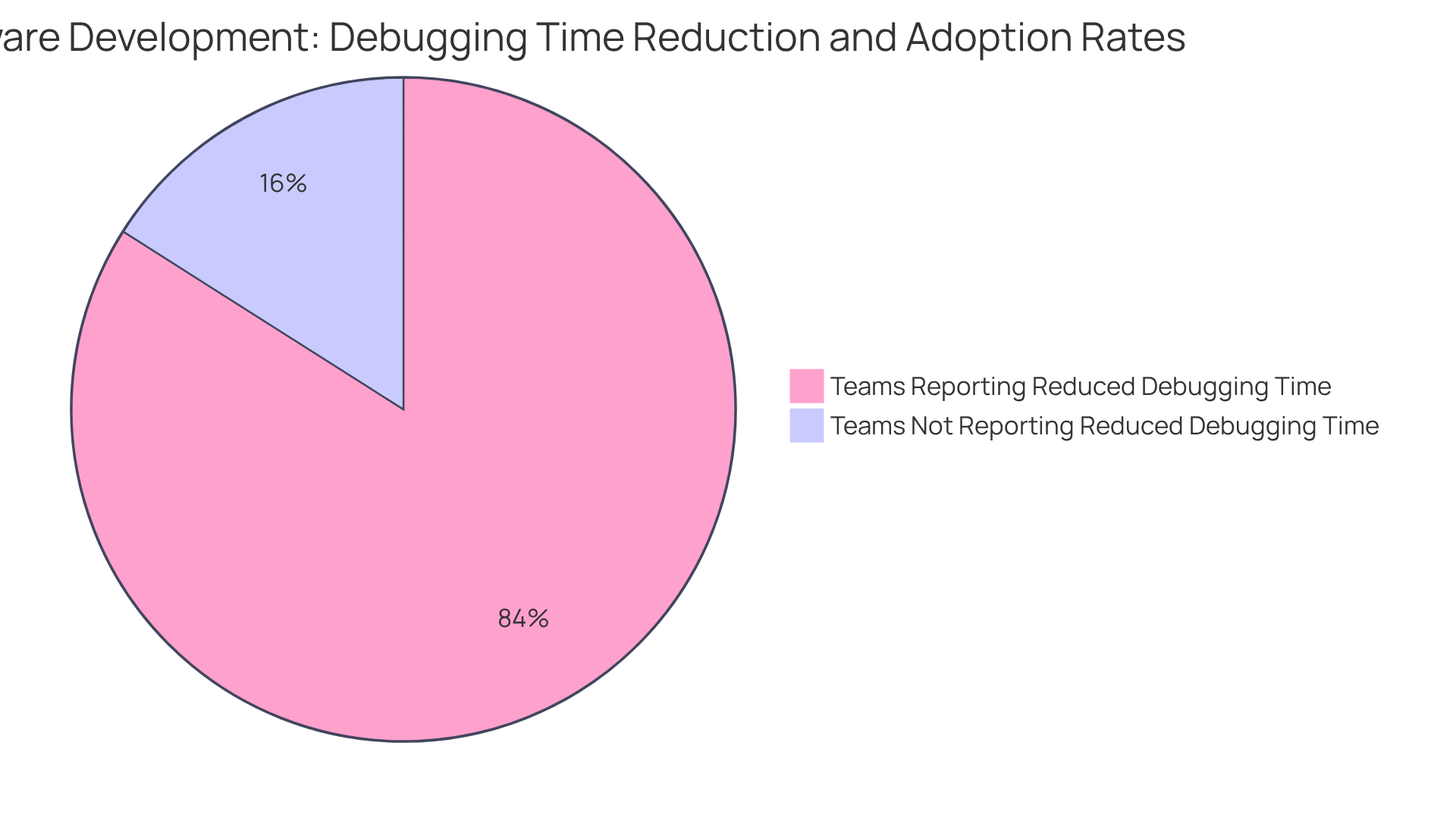
Conclusion
The integration of AI log analyzers into development teams signifies a transformative shift in how organizations manage and utilize log data. This automation of log analysis not only boosts efficiency and productivity but also allows teams to concentrate on strategic initiatives rather than mundane tasks. The advantages of adopting AI for log analysis are evident: faster incident detection, improved security measures, and optimized resource utilization contribute to a more effective development workflow.
Key insights have emerged throughout the discussion, such as the remarkable reduction in breach containment times and the swift identification of root causes of issues. Furthermore, the collaborative benefits of shared AI insights cultivate a culture of teamwork and innovation, leading to superior project outcomes. As organizations face rising data demands, the scalability of AI log analyzers ensures that teams can adapt and thrive in an increasingly complex digital landscape.
Embracing AI log analysis is not merely a technological upgrade; it is a strategic imperative for development teams striving to remain competitive. The potential for increased efficiency and enhanced security measures underscores the necessity of incorporating these tools into existing workflows. As the software development landscape evolves, organizations are encouraged to explore AI solutions like Kodezi to unlock their full potential and drive future success.
Frequently Asked Questions
What is Kodezi OS and how does it assist developers?
Kodezi OS is a professional OpenAPI specification generator that automates log analysis for development teams. It leverages AI-driven features to independently observe records, detect irregularities, and provide actionable insights, allowing teams to focus on strategic initiatives instead of manual log management.
How does Kodezi OS improve efficiency in log management?
Kodezi OS accelerates the evaluation process and reduces the risk of human error, ensuring that logs are consistently and accurately assessed. This efficiency enhances overall productivity in software development and integrates seamlessly into DevOps and SecOps workflows.
What advantages do AI log analyzers offer in incident detection?
AI log analyzers significantly improve incident detection by processing extensive log data in real-time, swiftly identifying patterns and anomalies. This proactive approach expedites response times and strengthens system reliability compared to traditional, manual review methods.
What impact do AI log analyzers have on security incident response?
Companies using AI log analyzers for incident response have reported a reduction in breach containment time by as much as 40% and a 50% decrease in security team workload, which helps alleviate burnout among team members.
How does AI-driven log analysis enhance security?
AI-driven log analysis continuously monitors logs for suspicious activities, facilitating early identification of security threats. It uses advanced machine learning algorithms to evolve and recognize new threats, improving detection capabilities over time.
Why is it important to incorporate AI in log examination for security?
With the increasing prevalence of AI-driven threats and the expectation of daily AI assaults by 2025, incorporating AI in log examination is crucial for maintaining strong security measures and protecting sensitive information. The financial implications of breaches further emphasize the need for advanced security tools.
What are some statistics related to the effectiveness of AI in security?
Organizations using AI log analyzers have reported significant improvements in threat detection efficiency and response times. Additionally, 93% of security leaders expect daily AI assaults by 2025, and the average cost of a data breach is approximately $4.88 million.




